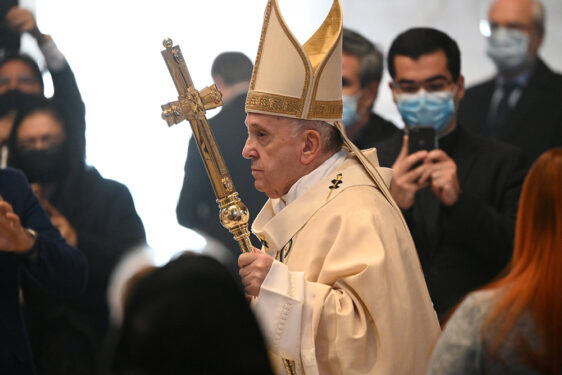
WINDSOR TERRACE — The Chinese foreign ministry dismissed Pope Francis’ criticism of China’s treatment of Muslim Uighurs as groundless. In a new book to be released next month, “Let Us Dream: The Path to a Better Future,” the pontiff said that he often thinks of “persecuted peoples: the Rohingya, the poor Uighurs, the Yazidi.”
China’s Foreign Ministry Spokesperson Zhao Lijian said Pope Francis’ remarks had “no factual basis at all.”
“People of all ethnic groups enjoy the full rights of survival, development, and freedom of religious belief,” Zhao said during a briefing.
For the first time, Pope Francis publicly called China’s Uighurs a persecuted people — something human rights activists have been urging him to do. In the book, Pope Francis talks about the need to see the world from the peripheries and society’s margins, where “sin and misery … suffering and illness and solitude” exist.
In October, the Vatican renewed its controversial agreement with Beijing on nominating Catholic bishops. At that time, Pope Francis did not speak about the subject.
When media outlets asked Zhao if China asked the Vatican not to talk about freedom and human rights in Hong Kong, he said he wasn’t aware of the situation.
“China will continue to engage in constructive dialogues with the Vatican and work for the improvement of bilateral relations,” Zhao said.
Religious Minorities
In a late vote this past May, the U.S. House overwhelmingly passed a measure condemning the Chinese Communist Party for forcing Uighurs, ethnic Kazakhs, and other Muslim minorities into indoctrination camps in the country’s Xinjiang region.
Top U.S. State Department officials have singled out China as one of the world’s worst offenders of religious freedom because it had subjected religious minorities to imprisonment and forced labor. The release of the annual Report on International Religious Freedom covering 2019 continued the U.S. government’s monthslong campaign of strong criticism of the Chinese government’s actions on several fronts.
China has been designated a “country of particular concern” in annual reports dating back to 1999. The Chinese government recognizes five official religions: Buddhism, Taoism, Islam, Protestantism, and Catholicism. Members of each of these religious groups must register before they can participate in religious services. Many faith practitioners have reported they are subject to surveillance and persecution, however.
Catholic News Service contributed to this report.
